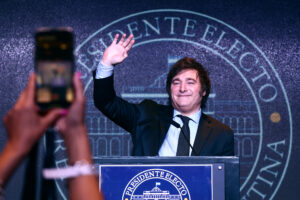By David Smilde, WOLA Senior Fellow
After fourteen years under a president who was wildly popular among some, reviled among others; after the tragic death of a popular president generated deep emotions among a significant part of the population; after a short but negative campaign marked by the by now customary abuse of state resources in favor of the incumbent, Venezuela went to the urns on Sunday and the results showed a closely divided country. The narrow margin in favor of Nicolas Maduro over Henrique has resulted in a political stalemate that will require statesmanship on both sides if is to be resolved peacefully.
National Electoral Council (CNE) president Tibisay Lucena stated yesterday that it was not the CNE’s role to push forward with a recount when there was no manifest problem with the electoral system’s functioning. She suggested that political contenders with complaints need to use legal channels established by the Constitution and the law.
Indeed, there is a legal protocol that needs to be followed and the CNE’s lone opposition rector, Vicente Diaz, also asked the Capriles camp to come forward and file their grievance. But what Lucena said was also a little disingenuous. While it is true that the Capriles camp has not proceeded with a formal request for an audit, her fellow CNE rector Vicente Diaz has. Yet the CNE did not get around to discussing it yesterday. She also surrounded it by suggesting that the paper ballot is just a receipt and the actual vote is in the memory of the machine. If that is the case it is hard to understand why every election is followed by a citizen audit of 54% of the ballot boxes.
The CNE needs to prioritize the demand for a 100% audit. On election night President Elect Maduro agreed with the idea. Even if the system did function well, in light of the fact that a significant part of the population does not trust the result, it would be prudent to carry out the audit. Showing some statesmanship at this point would only increase the credibility of the CNE. It would also increase the credibility of Maduro—credibility he will improve his chances for a successful presidency.
Henrique Capriles call for an audit is certainly understandable. However, the Capriles camp needs to document its complaints and file them with the CNE, prioritizing institutional channels before street mobilizations. Until they are able to provide concrete proof of problems with the system that could alter the margin, it looks like they are blowing smoke.
Language is important as well. Continually calling Maduro illegitimate while calling for “peaceful” street mobilizations also seems disingenuous. After fifty years of electoral democracy, Venezuelans are not going to accept illegitimate authority peacefully. Julio Borges statements that the vote showed that Chavismo as a political movement is “fatally wounded” was predictably used by Maduro to warn government supporters that the opposition aimed to eliminate them.
The opposition clearly runs the danger of overplaying its hand. It is not really even necessary to look at the example of López Obrador in Mexico-who used a legitimate complaint of electoral wrong doing to shut down Mexico City and burned out his political viability. Simply looking at the Venezuelan opposition’s own not-so-distant past should be enough. The strikes, protests, claims of fraud and calls for abstention from 2003-2005 seriously undermined the opposition’s viability. They have steadily climbed back by working through democratic institutions, even where those institutions are not fully fair. But now they risk putting themselves in a position where it will not be hard for the government to portray them as violent and anti-democratic.
The electoral process has left Capriles strengthened and the opposition in good shape for future electoral contests. Indeed, the opposition has come a long way since its largely self-inflicted wounds in 2003-2005. Capriles himself deserves no small measure of the credit for the opposition’s renewed credibility. Showing statesmanship and commitment to democratic institutions in the current context would only increase the opposition’s viability.
To continue following Venezuela's transition to a post-Chavez era, visit WOLA's Venezuelan Politics and Human Rights blog.


